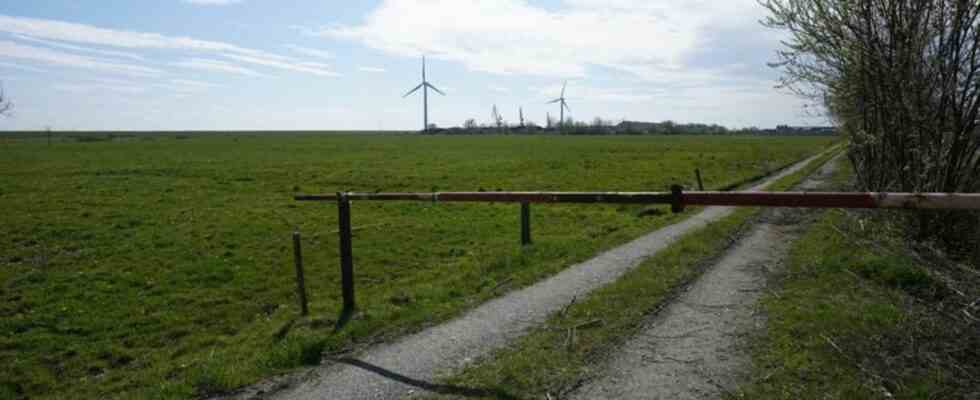war in Ukraine
The fragile economy – what threatens Germany
View of a meadow in Brunsbüttel where an LNG terminal is to be built. The state parliament in Kiel has accelerated the construction of the terminal for liquid natural gas in the Schleswig-Holstein port city. Photo: Marcus Brandt/dpa
© dpa-infocom GmbH
Rarely has a federal government’s forecast been so fraught with uncertainty. The German economy was actually on course for recovery, but the consequences of the Ukraine war are causing major problems.
The economy in Germany is already fragile – but stopping Russian gas deliveries could plunge the economy into a serious crisis.
“A demolition of gas supplies at this point in time would drive the German economy into a recession,” said Economics Minister Robert Habeck (Greens) on Wednesday in Berlin. The stop of Russian gas deliveries to Poland and Bulgaria automatically leads to the question: when will Russian President Vladimir Putin turn off the gas supply to Germany?
This question is difficult to answer. Habeck said he takes stopping deliveries to Poland and Bulgaria very seriously. The German energy companies that buy Russian gas, however, behaved in accordance with the contract. They pay in euros, and Gazprombank then converts the money into rubles. The big question is whether that’s enough for Putin.
According to the ministry, forecasts predicted that German economic output would shrink by 0.5 to 6.5 percent in the event of a Russian delivery stop. The economic development depends on the further course of the war.
The order books are still full
But the German economy is still growing this year – according to the forecast. Habeck referred, for example, to the full order books of many companies. However, like many institutes before it, the federal government significantly lowered its growth expectations. She only expects gross domestic product to grow by 2.2 percent in 2022 and 2.5 percent in 2023. In January, she had predicted growth of 3.6 percent.
This means that Germany has “literally become poorer” compared to the forecast in January, said Habeck. He referred to various measures to relieve citizens and help companies. But not everything can be balanced. That’s the price Germany has to pay, said Habeck — to support Ukraine. “We have to be willing to pay that price.”
The ministry named the high energy prices as the main reason for the clouding of the economic outlook, but the sanctions against Russia and the increased uncertainty also weighed on the growth prospects of the German economy. The prognosis is associated with great uncertainties. “No one currently knows how deeply the crisis will hit our economy,” said DIHK General Manager Martin Wansleben.
No relief for consumers in sight
Above all, there is bad news for consumers: the federal government does not expect the high consumer prices to ease anytime soon. An inflation rate of 6.1 percent is expected for 2022. Such rates have so far only been observed during the oil crisis or shortly after reunification, it said. Fueled by the sharp rise in energy prices, the inflation rate climbed to 7.3 percent in March. According to the forecast, the inflation rate will be significantly lower again next year at 2.8 percent.
But that too is only a forecast. Because if Russia really stops gas deliveries to Germany, prices are likely to continue to rise. The federal government has significantly reduced its dependence on Russian gas since the beginning of the Russian war of aggression against Ukraine: while the share of Russian supplies was 55 percent last year, according to Habeck it has now fallen to 35 percent.
However, if these deliveries fail immediately, Habeck believes that this cannot be compensated for. For this reason he spoke out against a Western embargo and warned of serious economic damage. Most of Russian natural gas is used in industry, for example in the chemical industry. In the event of an embargo, the chemical industry had warned of an interruption in supply chains in almost all sectors – such as the automotive industry, agriculture or the pharmaceutical industry. And about half of all apartments in Germany are heated with natural gas.
No reason to declare the second stage
The security of supply is currently guaranteed, said Habeck. At the end of March, he had already proclaimed the first of three stages of a gas emergency plan as a precaution in case of an emergency. After Russia’s move against Poland and Bulgaria, Habeck sees no reason to declare the second level, the alert level, in which the preparations for an emergency would be tightened again.
The third level, the emergency level, would in all likelihood take effect if Putin turned off the gas tap. Then the state would intervene in the gas market. Private household customers or hospitals would be particularly protected. On the other hand, industrial plants could be switched off from the gas supply.
Putin uses “energy as a weapon”, said Habeck. One must not be defenseless when this happens. Therefore, the renewable energies from wind and sun in Germany must now be expanded quickly. But there are still major obstacles to this – above all long planning and approval processes before a wind turbine can be connected to the grid. Legal changes are to be introduced soon. Habeck showed the way: If in doubt, you have to dig before the permit is granted.

